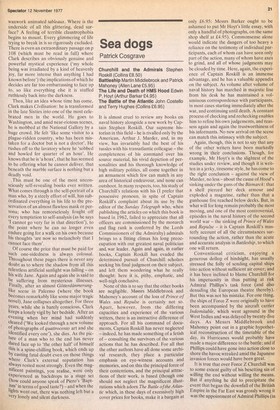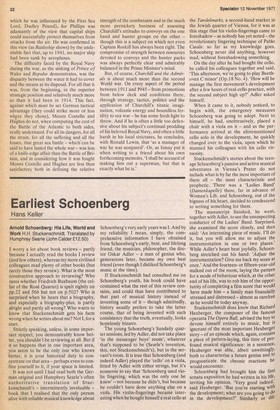Sea dogs
Patrick Cosg rave
Churchill and the Admirals Stephen Roskill (Collins E8.50) Battleship Martin Middlebrook and Patrick Mahoney (Allen Lane £5.95) The Life and Death of HMS Hood Edwin P. Hoyt (Arthur Barker 24.95) The Battle of the Atlantic John Costello and Terry Hughes (Collins £6.95) It is almost cruel to review any books on naval history alongside a new work by Captain Stephen Roskill. Our supreme historian in this field — he is rivalled only by the American, Arthur J. Marder, and, in my view, has invariably had the best of his tussles with his transatlantic colleague — the completeness of his command over his source material, his vivid depiction of personalities and his thorough knowledge of high military politics, all come together in an armament which few can match in any area of historical endeavour, and none can outshoot. In many respects, too, his study of Churchill's relations with his (1 prefer that possessive pronoun, in spite of Captain Roskill's complaint about its use by the editor of the Sunday Telegraph who, when publishing the articles on which this book is based in 1962, failed to appreciate that all officers are commissioned by the monarch and flag rank is conferred by the Lords Commissioners of the Admiralty) admirals brings to a fitting climax his long preoccupation with our greatest naval politician and, war leader. Again and again, in earlier books, Captain Roskill has evaded the determined pursuit of Churchill scholars seeking his final judgment on their subject, and left them wondering what he really thought: here it is, pithy, emphatic, and well-nigh conclusive.
None of this is to say that the other books are negligible. Messrs Middlebrook and Mahoney's account of the loss of Prince of Wales and Repulse is certainly not so. Apart, however, from the differing capacities and experience of the various writers, there is an instructive difference of approach. For all his command of documents, Captain Roskill has never neglected — indeed, he has made something of a fetish of — consulting the survivors of the various actions that he has described. For all that the other authors have all done some archival research, they place a particular emphasis on eye-witness accounts and memories, and on this the principal force of their contentions, and the principal attractions of their work, is based (though one should not neglect the magnificent illustrations which adorn The Battle of the Atlantic which, in these days of excessively high cover prices for books, make it a bargain at only £6.95: Messrs Barker ought to be ashamed to put Mr Hoyt's little essay, with only a handful of photographs, on the same shop shelf at £4.95). Commonsense alone would indicate the dangers of too heavy a reliance on the testimony of individual participants, each of whom can have seen only part of the action, many of whom have axes to grind, and all of whose judgments may be clouded by time. Here, again, the experience of Captain Roskill is an immense advantage, and he has a valuable appendix on the subject. As volume after volume of naval history has marched in majestic line from his desk he has maintained a vol uminous correspondence with participants, in most cases starting immediately after the war, and continuing until death. A constant process of checking and rechecking enables him to refine his own judgements, and reassess again and again the trustworthiness of his informants. No new arrival on the scene can match this intimacy with the subject.
Again, though, this is not to say that any of the other writers have been markedly wrong in their conclusions. Though, for example, Mr Hoyt's is the slightest of the studies under review, and though it is writ ten in a jerky, tiresome style, he has come to the right conclusion — against the view of Marder, no less — about the cause of Hood's sinking under the guns of the Bismarck: that a shell pierced her deck armour and exploded a magazine, rather than that a gunhouse fire reached below decks. But, in what will for long remain probably the most moving, and one of the most controversial, episodes in the naval history of the second world war — the sinking of Prince of Wales and Repulse — it is Captain Roskill's mas terly account of all the circumstances surrounding the action, rather than the acute and accurate analysis in Battleship, to which one will return.
Conventional criticism, enjoying a generous dollop of hindsight, has usually stressed the folly of sending capital ships into action without sufficient air cover; and it has been inclined to blame Churchill for his impetuosity in thus putting at risk Admiral Phillips's task force (and also denuding the European theatre thereby).
But this was not his mistake. For one thing, the ships of Force Z were originally to have been accompanied by the aircraft carrier Indomitable, which went aground in the West Indies and was delayed by twenty-five days. As Messrs Middlebrook and Mahoney point out in a graphic hypothetical reconstruction of the timetable of the day, its Hurricanes would probably have made a major difference to the battle; and if Phillips could have gone into action close to shore the havoc wreaked amid the Japanese invasion forces would have been great.
It is true that over Force Z Churchill was to some extent guilty of his besetting sin of willing the end without willing the means. But if anything he did to precipitate the event that began the downfall of the British Empire in the Far East was grossly wrong it was the appointment of Admiral Phillips (in which he was influenced by the First Sea Lord, Dudley Pound),, for Phillips was adamantly of the view that capital ships could successfully protect themselves from attacks from the air. He was confirmed in this view (as Battleship shows) by the undeniable fact that, up to 1941, no major ship had been sunk by aeroplanes.
The difficulty faced by the Royal Navy during the war, as the sinking of Prince of Wales and Repulse demonstrates, was the disparity between the water it had to cover and the means at its disposal. For all that it was, from the beginning, in the superior strategic position and relatively much more so than it had been in 1914. This fact, against which must be set German tactical advantage (they could strike more or less where they chose), Messrs Costello and Hughes do not, when computing the cost of the Battle of the Atlantic to both sides, really understand. For all its dangers, for all the strain, for all the suffering and all the losses, that great sea battle — which'can be said to have lasted the whole war — was less of a knife-edge affair than the Battle of Bri> tam, and in considering how it was fought Messrs Costello and Hughes are less than satisfactory both in defining the relative strength of the combatants and in the much more pernickety business of assessing Churchill's attitudes to convoys on the one hand and hunter groups on the other — though this is a subject on which not even Captain Roskill has always been right. The compromise of strength between resources devoted to convoys and the hunter packs was always perfectly clear and admirably balanced in the Prime Minister's mind.
But, of course, Churchill and the Admirals is about much more than the second World war. On every aspect of the period between 1911 and 1945 —from promotions from below deck and conditions there, through strategy, tactics, politics and the application of Churchill's titanic imagination, volcanic energy and boundless fertility to sea war — he has some fresh light to throw. And if he is often a little too defensive about his subject's continual prodding of his beloved Royal Navy, and often a little harsh in his local strictures, he concludes, with Ronald Lewin, that 'as a manager of war he was nonpareil'. Or, as Ismay put it when writing to a friend about his own forthcoming memoirs, `I shall be accused of making him out a superman, but that is exactly what he is.'



































 Previous page
Previous page